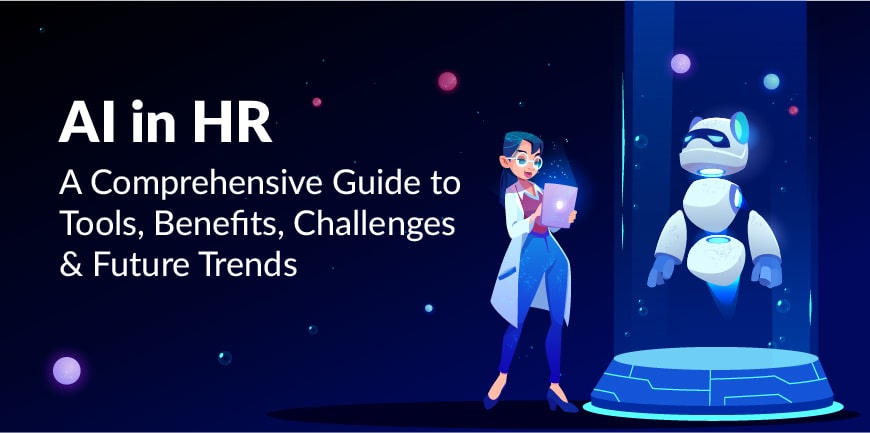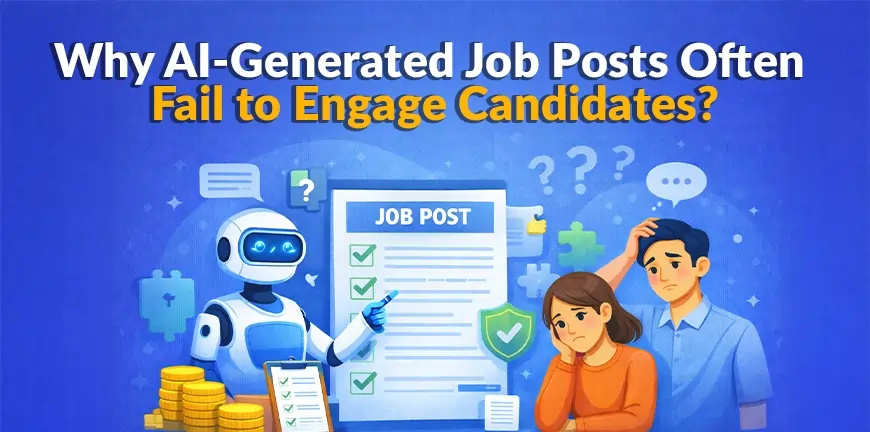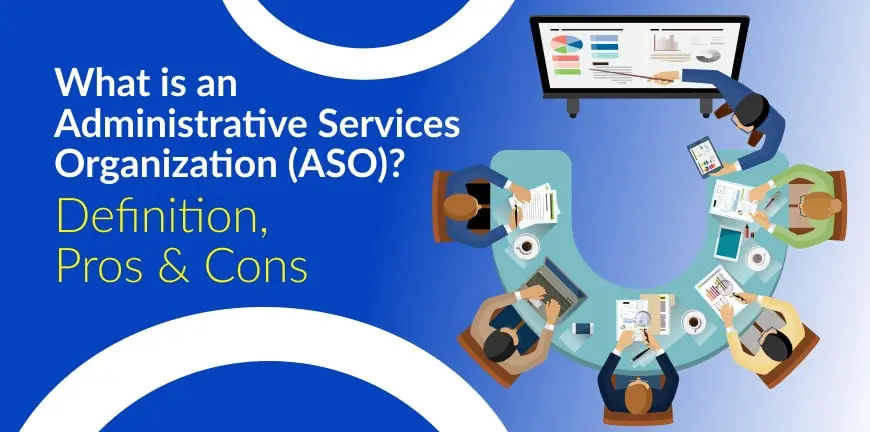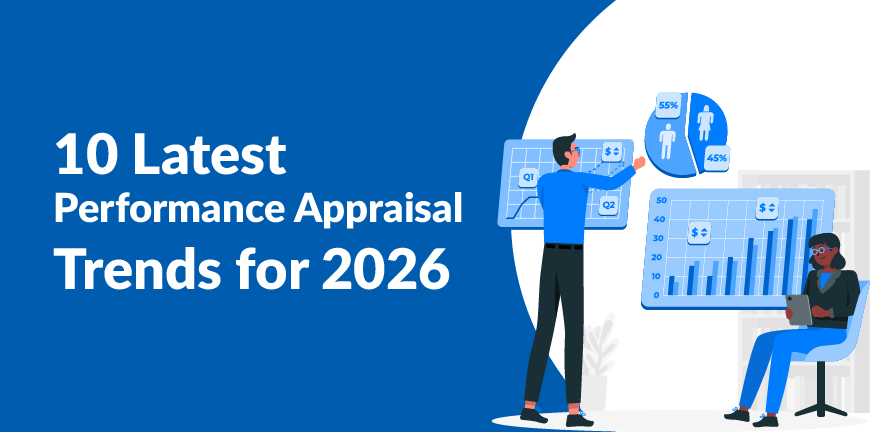
Tech Talent Spree in India: What It Means for Freshers and Professionals
13/05/2025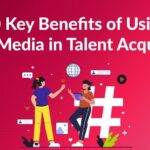
Top 10 Benefits of Social Media on Talent Acquisition
13/05/2025- Why is AI Important in HR?
- What are the Different Types of AI in HR?
- What are the Key Benefits of AI in HR?
- What are the Main Challenges of using AI in HR?
- What is the Future of AI in HR?
- What are the Best AI Tools for HR Professionals?
- Will AI Replace HR professionals in the future?
- Frequently Asked Questions (FAQs)
Step into the new era of Human Resources where recruitment processes are transformed with the help of advanced and innovative technologies like Artificial Intelligence (AI). Can you imagine a scenario where resumes are screened in seconds, employee engagement is monitored in real time, and turnover predicted before it happens.
AI in HR can make this happen. it is more than a tool. It is the new normal which enable companies to draw, retain, and support their most priced asset that is people.
Why is AI Important in HR?
The impact of AI on HR is tremendous as it is revolutionizing the recruitment landscape as it is enhancing efficiency by automating processes from screening to onboarding and automating repetitive tasks freeing up the rime of the employee and the HR professionals who can now focus on strategic work.
In recruitment there can be chances of unconscious bias that can be eliminated by AI generated processes. Profiles and data can be evaluated objectively identifying patters that humans can miss.AI can accelerate employee experiences by personalizing employee engagement programs driving satisfaction and retention.
Approximately 26% of Indian organizations are leveraging AI-driven tools to enhance talent management and workforce analytics,
Around 69% of companies have automated routine HR tasks, streamlining operations.
What are the Different Types of AI in HR?
The role of AI in HR is influenced by how it is being utilized for different processes. There are four types of AI typically used in an array of processes including recruitment, onboarding, performance development and employee engagement.
Generative AI, Machine Learning (ML), Natural Language Processing (NLP)and Predictive Analysis. Generative AI can generate emails, reports, documents and many more. Which brings us to the bigger picture of machine learning: ML is a kind of deep learning used to train computers to do tasks done by humans like face recognition, speech pattern recognition. It enables organizations to make smarter hiring decisions.
NLP is used in HR for analysing any written communication like employee reviews enabling employers to understand the employee performance help sentiments. Predictive analytics can support HR to make informed hiring decisions after gaining insights from the past hiring data.
What are the Key Benefits of AI in HR?
In recent years, AI has made its way into the recruitment sector just like other industries. It has streamlined the recruitment process and enhanced efficiency. Here are a few benefits of AI in HR:
1. Reduced Bias
AI-powered recruitment tools evaluate candidates with the help of data-driven algorithms that focus on skills, experience, and performance indicators and not on subjective factors.
Advanced AI systems analyse recruitment patterns and identify biased results like disproportionate rejection rates. This enables HR managers and teams to review and revise their practices.
2. Improved Efficiency
AI and ML powered algorithms can automate many tasks and make life easier for HR professionals. They can for instance analyse and filter huge volumes of applications by catering to job-specific keywords and qualifications.
The automation of these operational activities enables HR managers and teams to focus on strategic and high value functions enhancing efficiency and overall business outcomes.
3. Personalized Learning
AI can evaluate an individual’s skills through machine learning algorithms and can compare a current skill against the skills required for a particular role or future jobs.
They can identify gaps after analysing and can recommend customized learning patterns and ways that cater to the requirements of the employee and meet the organization’s goals. This assistance impact employee capabilities significantly making learning and skill development a continuous process.
4. Improved Candidate Experience
air backed tools can enhance the candidate experienced by making communication more personalized and responsive. Candidates can interact with AI powered systems in real time through chatbots and virtual assistants.
These systems can solve queries regarding the job role, company culture or application status.AI systems can streamline processes generating fair and unbiased assessments. The process is agile and fast that increases the satisfaction level of a candidate.
The AI in HR market in India is projected to grow from $6.05 billion in 2024 to $6.99 billion in 2025, at a compound annual growth rate (CAGR) of 15.6%.
What are the Main Challenges of using AI in HR?
AI trends in HR are transforming the functioning of the recruitment space, but it also brings along challenges. Let us look at some of the key challenges:
1. Data Privacy and Security
AI powered systems often must evaluate and process large volumes of sensitive and personal data that entails employee identification details, salary and compensation information or health records.
These data’s need to be safeguarded as risks of unintended data exposure through erratically secured systems or software vulnerabilities, AI tracking employee behaviours in an intrusive manner, AI decisions get influenced by biased or incomplete data, Organizations must mitigate these risks by introducing a sturdy ethical and transparent data protection measures.
2. Lack of Transparency
A concern with AI algorithms especially those using deep learning or complex machine learning models generate predictions that are not clearly revealed and are not certain as to how they reached the outcomes.
As these decisions are directly related to people’s careers, blurred clarity might lead to distrust and claims of discrimination and being judged unfairly. It is imperative for organizations to ensure that these systems are transparent and traceable.
They must be documented and justified clearly. Additionally continuous monitoring of AI systems and models can help mitigate this risk.
3. Integration with Existing Systems
Organizations mostly have comprehensive HR systems set up and introducing AI into the system can be a bit of a hurdle. Implementation of AI requires a well thought out integration to ensuring that AI solutions can seamlessly connect with the existing with existing data structures, and workflows.
Integrating AI with HR systems can be challenging technically and organizationally. Integrations that are poorly executed may disrupt the daily functioning of HR systems like payroll runs, onboarding, or recruitment pipelines.
There is an additional risk of losing data or corruption during the syncing processes. Firms should adopt robust strategies to eliminate the complexities ensuring smooth integration.
4. Ethical Factors
Ethical considerations should be the primary concern. It is true that of an organization when they are integrating AI powered systems can be immensely beneficial for companies in terms of efficiency and bringing insight to recruitment, onboarding, performance evaluation, etc.
However, it is people’s careers, wellbeing, and livelihoods along with ethical concerns that HR deals with directly in this area and they must be alert and careful. AI systems get information from historical data, which may contain existing biases including gender, race, or age disparities in a recruitment process.
The AI systems must be monitored properly to avoid enhanced discrimination against underrepresented groups. The decisions are made by AI, but it is often unclear who is responsible for the decision and the dearth of explainability leas to disruptive workflow and a negative impact on a business.
5. Privacy and Consent
With AI taking over, privacy has become a significant concern as advanced AI tools utilized in HR captures and interprets an array of personal and behavioural data. AI can identify typing speed, rhythm, or frequency to evaluate focus and identify individuals. The problem lies when the level of data collection encroaches the personal territory.
It automatically raises many ethical and legal concerns. Even unacknowledged data can sometimes be re-identified leading to a compromised confidentiality. It is up to organizations to clearly communicate the type of data is collected, how it will be utilized and who will access it. They must also make efforts to acquire informed consent and avoid intrusive surveillance methods.
6. Skill Gap
HR operations are significantly getting transformed by Artificial Intelligence starting from tasks like screening resumes, scheduling interviews, and monitoring employee engagement which were once done manually.
The shift is driving Hr management to evolve into a more strategic level of decision making which requires upgrading skill sets and comprehend how AI tools operate and align with and HR goals.
The hr managers must develop skills to read, interpret, and draw conclusions from HR analytics. They should be able to understand several metrics like employee turnover predictions, engagement scores, and performance trends.
Training and development in today’s HR landscape is no more an option but has become essential for successfully implementing AI systems that will foster business growth.
7. Cost and ROI Factors
Organizations while adopting Artificial Intelligence in Human Resources must be aware of the cost implications as there will be ongoing expenses that they will have to tackle upfront. The costs will involve software and licensing fees.
AI-enabled HR tools are often expensive. Expenses may vary based on features, scalability, and other factors. Then there will be other costs involved during integration into the HR systems and AI systems might also require upgrades.
Firms will also have to invest in training and development programs for effective usage of AI powered tools. Organizations must also take appropriate measures to ensure a strong return on investment.
8. Lack of Human Intervention
AI enabled systems are agile prompt and can enhance decision making, however, the dearth of human oversight can hinder processes as these advanced technologies lack the ability to totally comprehend nuanced human behaviour, cultural differences, or specific organizational contexts resulting.
They will not understand empathy and emotional intelligence resulting in flawed evaluation. AI models can furthermore reinforce biases in pre-existing training data, like being biased to specific demographics in hiring. Human oversight is essential to identify and relieve these biases to ensure fair and inclusive operations.
What is the Future of AI in HR?
Artificial Intelligence is making waves in all industries, and The HR landscape is also experiencing its ripples. HR teams and leaders are increasingly implementing AI enabled tools in their operations to accelerate efficiency, innovation, and employee engagement.
To stay ahead of the curve, it is crucial for HR leaders, to standardise their growth trajectory and judicially plan the implementation and integration of AI systems in their HR functions. The excitement around AI is real and many HR functions have already taken a dive into its implementation.
Survey suggests that HR leaders are either on pilots for AI implementation or on the verge of implementing AI and few of them have already implemented. There has been a distinctive surge in AI implementation in HR systems since 2023.
The growth establishes that AI for HR process is here to stay and is set to revolutionize HR operations. However, it is for HR leaders to harness its full potential by must overcoming challenges and plan their strategies carefully. They must address issues related to transparency, reliability, and assurance by collaborating with IT, legal and compliance teams. Ensuring a coordinated approach is essential in creating an AI HR strategy along with focusing on AI related employee skill development.
What are the Best AI Tools for HR Professionals?
There is a wide range of AI tools for HR management systems supporting HR professionals with task automation, enhancing data analysis, and improving employee experience. The best of tools is used for AI recruitment tools then there are HR chatbots and AI-powered scheduling applications.
The top tools for recruitment and talent acquisition are Attract AI, Lever, Peoplebox.ai, Checker. For HR operations and automations, the best tools are Paradox, Leena AI, UKG Pro HCM, Gusto, TINYpulse, Officevibe, etc.
Will AI Replace HR professionals in the future?
In a world where the artificial intelligence revolution is taking its course, the HR industry is profoundly evolving with it as well. The advantages of AI enable systems are well acknowledged by various HR departments as the use of this technology is streamlining their work by automate workflows and managing simple tasks.
However, there is a growing concern among HR professionals, employees, and candidates as the presence of AI solutions also becomes pronounced. An AI software could make vital decisions like hiring or termination can be unnerving, given the capabilities of such technology.
We are fortunate and evidence shows that AI in HR will unlikely replace any role or for that matter make final decisions. It Is instead a powerful tool that can support the HR management system in expediting mundane, repetitive work enabling HR managers and leaders to focus on core responsibilities. HR teams will use AI in future to make their processes more efficient effective, intelligent, and streamlined.
Frequently Asked Questions (FAQs)
1. What can AI do for HR?
AI can support HR management systems by streamlining systems. AI enabled tools can help expedite tasks like resume screening, interview processes and onboarding. It can also facilitate data driven decision making, improve employee experience, optimize talent management and enhance employee engagement.
2. What is the best AI tool for HR?
There are several AI tools that can be used for HR management. The tools will be typically utilized as per the specific requirements and objectives of a company. A few popular and useful AI tools for HR are Attract AI, Lever, Peoplebox.ai, Checker. And many more.
3. What is the role of AI in HR?
AI plays a significant role in HR today. It has become an important too in making the operations of HR management easier by helping HR managers and leaders make smart and informed decisions, it improves efficiency and enhances employee management driving organizations to meet their business goals.
4. How is AI used in HR analytics?
AI-backed analytics helps HR teams in collecting data from an array of sources including surveys, performance metrics, and engagement scores. With the help of the results, HR leaders can handle challenges, predict outcomes, and reduce bias.
5. Is ChatGPT generative AI?
ChatGPT Is an algorithm of generative AI which is designed to generate texts like humans do in response to prompts. They allow individuals to rewrite texts in different forms.
Contact Us For Business Enquiry

Rajkumar Shanmugam
Rajkumar Shanmugam is the Head of HR at ALP Consulting, bringing over 19 years of comprehensive HR leadership experience across India and international markets. His expertise spans talent acquisition, employee relations, performance management, compliance, and HR transformation. Rajkumar has a proven track record of driving people-centric initiatives, enhancing workplace culture, and aligning HR strategy with business goals. With extensive experience in US staffing operations and global mobility, he continues to lead organizational excellence through innovation and employee engagement.

